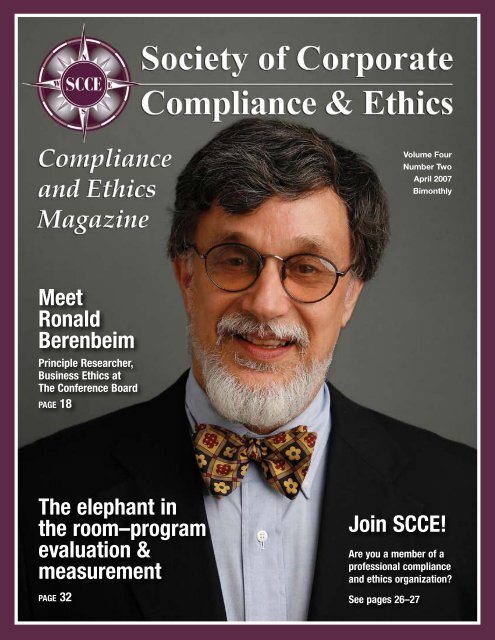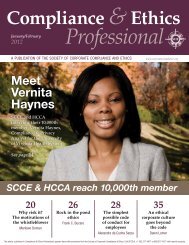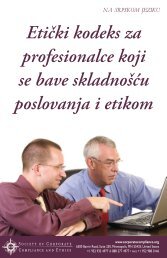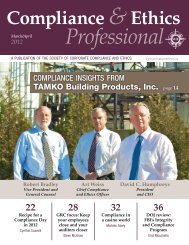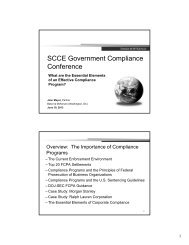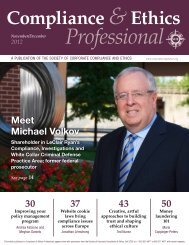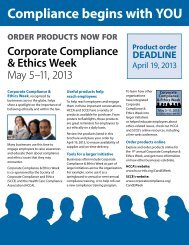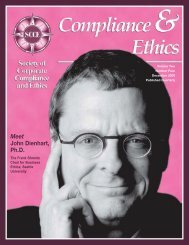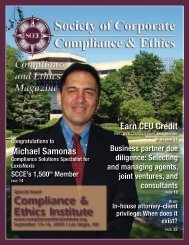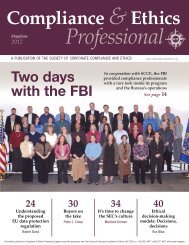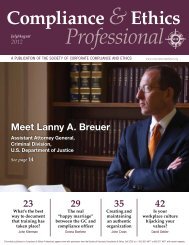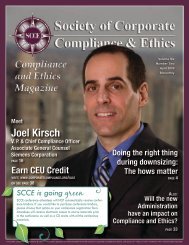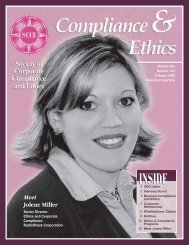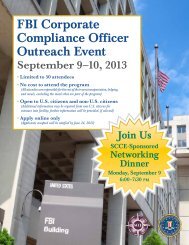Meet Ronald Berenbeim - Society of Corporate Compliance and Ethics
Meet Ronald Berenbeim - Society of Corporate Compliance and Ethics
Meet Ronald Berenbeim - Society of Corporate Compliance and Ethics
You also want an ePaper? Increase the reach of your titles
YUMPU automatically turns print PDFs into web optimized ePapers that Google loves.
Volume Four<br />
Number Two<br />
April 2007<br />
Bimonthly<br />
<strong>Meet</strong><br />
<strong>Ronald</strong><br />
<strong>Berenbeim</strong><br />
Principle Researcher,<br />
Business <strong>Ethics</strong> at<br />
The Conference Board<br />
page 18<br />
The elephant in<br />
the room–program<br />
evaluation &<br />
measurement<br />
page 32<br />
<strong>Society</strong> <strong>of</strong> <strong>Corporate</strong> <strong>Compliance</strong> <strong>and</strong> <strong>Ethics</strong> • (888) 277-4977 • www.corporatecompliance.org<br />
Join SCCE!<br />
Are you a member <strong>of</strong> a<br />
pr<strong>of</strong>essional compliance<br />
<strong>and</strong> ethics organization<br />
See pages 26–27<br />
<br />
April 2007
feature article<br />
<strong>Meet</strong> <strong>Ronald</strong> <strong>Berenbeim</strong><br />
Principle Researcher, Business <strong>Ethics</strong> at The Conference Board<br />
Editor’s Note: José A. Tabuena is with<br />
the Center for <strong>Corporate</strong> Governance at<br />
Deloitte & Touche LLP <strong>and</strong> serves on the<br />
Advisory Board for <strong>Compliance</strong> & <strong>Ethics</strong>.<br />
He conducted the following interview in<br />
March 2007 with Mr. <strong>Ronald</strong> <strong>Berenbeim</strong>,<br />
Principle Researcher, Business <strong>Ethics</strong> at The<br />
Conference Board. An authority on business<br />
ethics <strong>and</strong> corporate governance issues,<br />
Mr. <strong>Berenbeim</strong> has written 44 Conference<br />
Board studies. He can be reached at ronald.<br />
berenbeim@conferenceboard.org<br />
JT: Tell us about The Conference Board<br />
<strong>and</strong> its involvement in the field <strong>of</strong> ethics <strong>and</strong><br />
compliance, <strong>and</strong> how you ended up in your<br />
current role with The Conference Board<br />
RB: Since the organization was founded<br />
in 1916, the need to address business ethics<br />
<strong>and</strong> compliance (E&C) issues has been fundamental<br />
to The Conference Board’s mission.<br />
The current involvement which focuses on<br />
company ethics programs <strong>and</strong> practices began<br />
in 1986-87 with the confluence <strong>of</strong> two important<br />
events: (1) insider trading sc<strong>and</strong>als <strong>and</strong><br />
(2) defense procurement irregularities.<br />
Insider trading irregularities focused public<br />
interest on business ethics in a way that had<br />
not been seen at least since Watergate <strong>and</strong><br />
The Church Committee hearings on Foreign<br />
Corrupt Practices, but it was the defense<br />
contracting issues that had the more lasting<br />
effect. These revelations spawned the Defense<br />
Industry Initiative (DII) which led to the voluntary—<strong>and</strong><br />
in some cases, not so voluntary<br />
(pursuant to a settlement agreement)—development<br />
<strong>and</strong> implementation <strong>of</strong> company<br />
ethics programs. I am glad to say that some <strong>of</strong><br />
the original DII people are still active in The<br />
Conference Board’s <strong>Ethics</strong> research, councils,<br />
conferences, <strong>and</strong> working groups.<br />
Up to that time my own work on employee<br />
relations <strong>and</strong> global management practices had<br />
discussed some ethics issues, but it was a piece<br />
that I did on the transition from owner to<br />
pr<strong>of</strong>essional management in U.S., European,<br />
<strong>and</strong> Latin American companies that made the<br />
ethics sale for me. In every case, I found that<br />
a well-articulated code or statement <strong>of</strong> ethics<br />
was the key to an effective transition, so in<br />
1986-87, I did a research project on ethics<br />
codes <strong>and</strong> practices. The member response was<br />
very favorable, <strong>and</strong> we now have a full service<br />
program with research, executive councils, live<br />
<strong>and</strong> internet conferences <strong>and</strong> seminars, <strong>and</strong><br />
Research Working Groups in which senior<br />
executives work with us on specific research<br />
questions that are <strong>of</strong> special interest to them.<br />
I joined The Conference Board in 1977. At<br />
the time, I was a recovering lawyer who had<br />
spent my early career in labor relations. I continued<br />
to look at how companies dealt with<br />
labor relations-type problems through studies<br />
<strong>of</strong> employee complaint systems <strong>and</strong> plant<br />
closing case studies, <strong>and</strong> I did some work on<br />
international management organizations <strong>and</strong><br />
how companies in the U.S., Europe, Latin<br />
America, <strong>and</strong> Japan dealt with external pressure<br />
groups. All <strong>of</strong> these projects have served<br />
me well in developing our ethics research <strong>and</strong><br />
working groups, <strong>and</strong> it has been good preparation<br />
for the contributions that I have been<br />
able to make to our councils <strong>and</strong> conferences.<br />
JT: I think you will agree that there can be<br />
confusion with the term “governance.” How<br />
do you define corporate governance, <strong>and</strong> how<br />
does it relate to ethics <strong>and</strong> compliance<br />
RB: I do agree. Outside <strong>of</strong> the United<br />
States, the terms are <strong>of</strong>ten used interchangeably.<br />
The short-form answer is that ethics is<br />
to such areas as governance <strong>and</strong> corporate<br />
social responsibility (CSR) as mathematics is<br />
to physics <strong>and</strong> chemistry. Good physicists <strong>and</strong><br />
chemists need to be literate <strong>and</strong> competent in<br />
mathematics, <strong>and</strong> governance <strong>and</strong> CSR specialists<br />
need a comparable facility in ethics.<br />
Operationally, the boundaries between ethics<br />
<strong>and</strong> governance (the subject with which<br />
the definitions most <strong>of</strong>ten describe much the<br />
April 2007<br />
18<br />
<strong>Society</strong> <strong>of</strong> <strong>Corporate</strong> <strong>Compliance</strong> <strong>and</strong> <strong>Ethics</strong> • (888) 277-4977 • www.corporatecompliance.org
José Tabuena<br />
same thing) can be understood by describing<br />
the way in which work in is typically divided<br />
in a university political science program.<br />
Governance is akin to “government” – a<br />
descriptive term that focuses on governmental<br />
structure <strong>and</strong> processes, the division <strong>of</strong><br />
authority, <strong>and</strong> the most efficient <strong>and</strong> effective<br />
operation <strong>of</strong> its constituent elements. <strong>Ethics</strong><br />
is comparable to “political theory” in that it<br />
addresses the optimal approaches to political<br />
organization, with full consideration given to<br />
the rights <strong>and</strong> responsibilities <strong>of</strong> stakeholders.<br />
<strong>Compliance</strong> addresses the body <strong>of</strong> rules<br />
that emanate from <strong>and</strong> are limited by the<br />
organization’s ethical superstructure – much as<br />
our laws have evolved from the Constitutional<br />
principles on which the country was founded.<br />
A good governance system will devise <strong>and</strong><br />
administer these rules (<strong>and</strong> enforce compliance<br />
with the laws to which the sovereign<br />
entity is subject) fairly <strong>and</strong> with full respect<br />
for the rights <strong>of</strong> all affected parties.<br />
JT: But what about the board’s role Are<br />
there practical ways that boards <strong>of</strong> directors<br />
can provide oversight to the ethics <strong>and</strong> compliance<br />
program <strong>and</strong> its activities<br />
RB: Directors bring to their task a broad<br />
range <strong>of</strong> expertise, not just with respect to<br />
operational issues, but in many instances,<br />
from their service as members <strong>of</strong> other boards.<br />
This collective experience gives the company<br />
the advantage <strong>of</strong> a great variety <strong>of</strong> oversight<br />
perspectives. They ought to be the best protection<br />
a company has against the routine design<br />
<strong>and</strong> implementation <strong>of</strong> a cookie cutter, onesize-fits-all<br />
approach to company ethics programs.<br />
And, <strong>of</strong> course, directors are possibly<br />
the most important resource a company has in<br />
an ethics crisis.<br />
Unfortunately, some companies don’t<br />
bring their boards into the ethics discussion<br />
<strong>and</strong> boards do not seek to be part <strong>of</strong> the<br />
dialogue until a crisis stage. The Revised U.S.<br />
Sentencing Guidelines m<strong>and</strong>ate the need<br />
for ethics discussion at all levels within the<br />
company (including the board). It is a bit<br />
early to be critical, but thus far, our surveys<br />
have shown that board discussion has focused<br />
largely on the company’s program <strong>and</strong> how it<br />
works. At least according to our data, boards<br />
that have had discussions about the ethical<br />
dimension <strong>of</strong> areas where the company may<br />
be exposed to risk are not as common as one<br />
would like to see. And ethics <strong>and</strong> compliance<br />
risk assessments tend to focus on program<br />
policies, structure, <strong>and</strong> communications rather<br />
than on the behavioral threats (e.g., employee<br />
intent/incentives) that can actually cause ethics<br />
problems.<br />
JT: What about the relationship <strong>of</strong> governance<br />
to corporate responsibility or CSR<br />
RB: As is the case with any sovereign<br />
entity, a company has the responsibilities <strong>of</strong><br />
citizenship in the community, <strong>and</strong> today (in<br />
contrast with 30 years ago when I started with<br />
The Conference Board), the community is for<br />
most companies the entire world, not just the<br />
country <strong>of</strong> incorporation. Thirty years ago,<br />
business ethics was pretty much defined in the<br />
four corners <strong>of</strong> the contract. A typical business<br />
ethics formulation was the one articulated<br />
by Shylock who said “my word is my bond.”<br />
Throw in some charitable gifts—a few checks<br />
presented by the CEO at high school science<br />
fairs—<strong>and</strong> you had a pretty good definition<br />
<strong>of</strong> an ethical company: honesty, high-quality<br />
products, <strong>and</strong> a little bit <strong>of</strong> philanthropy.<br />
Today companies are challenged to show<br />
moral restraint in market failure situations<br />
which they can, if they so choose to exploit<br />
to their advantage. It becomes a sustainability<br />
issue—the greatest benefit comes from the<br />
cultivation <strong>of</strong> long-term relationships <strong>of</strong> trust.<br />
“Sustainability” is a popular buzz word today,<br />
but it is not a new concept. Henry Ford may<br />
have been its earliest proponent. He said that<br />
he paid his workers more than he had to, so<br />
they would be able to buy his cars. The key<br />
issue now is that the relationship between<br />
the developed <strong>and</strong> the developing world is<br />
one <strong>of</strong> persistent market failure, <strong>and</strong> the way<br />
in which the developed world deals with<br />
that problem will determine, quite likely, the<br />
planet’s long-term sustainability.<br />
JT: I know that The Conference Board has<br />
been studying <strong>and</strong> surveying ethics <strong>and</strong> compliance<br />
programs for some time. What are the<br />
major trends that you’ve seen regarding such<br />
programs<br />
RB: The structural elements <strong>of</strong> a good<br />
ethics program are now widely accepted. For<br />
example, in the 1987 study, relatively few<br />
companies had any kind <strong>of</strong> ethics training,<br />
<strong>and</strong> today at least some training (in many<br />
cases, <strong>of</strong> all employees) is nearly universal in<br />
medium size companies <strong>and</strong> above. The question<br />
may now be whether or not the training<br />
is sufficiently focused on the particular ethics<br />
exposure <strong>of</strong> individual employee groups.<br />
In companies with revenues <strong>of</strong> more than<br />
$500 million a year, you are likely to find a<br />
formally designated program with a person<br />
in charge, resources dedicated, a code <strong>of</strong><br />
conduct, a training program, <strong>and</strong> some sort<br />
<strong>of</strong> whistle blowing system. So it makes less<br />
sense than it did in the past to use these elements<br />
as benchmarks for good practice. In<br />
any event, my reading <strong>of</strong> the 2004 Revised<br />
Continued on page 20<br />
<strong>Society</strong> <strong>of</strong> <strong>Corporate</strong> <strong>Compliance</strong> <strong>and</strong> <strong>Ethics</strong> • (888) 277-4977 • www.corporatecompliance.org<br />
April 2007<br />
19
<strong>Meet</strong> <strong>Ronald</strong> <strong>Berenbeim</strong> ...continued from page 19<br />
Sentencing Guidelines is that the job is to<br />
promote an ethical culture throughout the<br />
company. Business ethics programs have now<br />
reached a defining moment similar to that<br />
<strong>of</strong> the Total Quality initiatives <strong>of</strong> the early-<br />
<strong>and</strong> mid-1990s. Following that model, will<br />
functional operations such as sales, marketing,<br />
<strong>and</strong> Human Resources eventually have their<br />
own ethics programs Arguably, much <strong>of</strong> this<br />
has already occurred in Finance. It seems<br />
inevitable that it will happen in this way, <strong>and</strong><br />
if <strong>and</strong> when it does, we may be able to subject<br />
ethics programs to more traditional metrics<br />
for program success, such as return on investment,<br />
productivity, etc.<br />
JT: How has the ethics <strong>and</strong> compliance<br />
pr<strong>of</strong>ession itself changed over time<br />
RB: First we need to define what is meant<br />
by the ethics <strong>and</strong> compliance pr<strong>of</strong>ession. Of<br />
course there are practitioners–company ethics<br />
<strong>and</strong> compliance <strong>of</strong>ficers <strong>and</strong> the consultants<br />
that advise them <strong>and</strong> their companies.<br />
Academics <strong>and</strong> even journalists who have<br />
focused on business ethics issues are also<br />
part <strong>of</strong> what I would call the “pr<strong>of</strong>ession.”<br />
There are the various institutes <strong>and</strong> associations<br />
everywhere in the world devoted to the<br />
dissemination <strong>and</strong> exchange <strong>of</strong> information<br />
on business ethics. And finally, there are the<br />
global organizations like the United Nations,<br />
OECD [Organisation for Economic Cooperation<br />
<strong>and</strong> Development], World Bank,<br />
<strong>and</strong> non-governmental organizations such as<br />
Transparency International that have made<br />
significant contributions to addressing business<br />
ethics problems. I have had an opportunity<br />
to work with all <strong>of</strong> these people, <strong>and</strong><br />
perhaps the most important change I have<br />
seen in the last 20 years is that each <strong>of</strong> these<br />
pr<strong>of</strong>essional categories now knows about the<br />
others <strong>and</strong> has an active interest in what they<br />
are doing. In addition, there are now people<br />
like myself who move freely throughout what<br />
I would call the global business ethics community.<br />
To give you just one example <strong>of</strong> how this<br />
fellowship <strong>of</strong> interest works, several months<br />
ago, Lori Tansey Martens, President <strong>of</strong> the<br />
International Business <strong>Ethics</strong> Institute, sent an<br />
e-mail to her friends <strong>and</strong> colleagues (not exactly<br />
a small number <strong>of</strong> people) asking for comments<br />
on the question “Has compliance killed<br />
business ethics” The number <strong>of</strong> responses <strong>and</strong><br />
the variety <strong>of</strong> sources from which they came<br />
was frankly quite surprising, even to me.<br />
By the way, I do not believe that compliance<br />
has killed business ethics <strong>and</strong> that was, I<br />
think, a minority view. A surprising number<br />
<strong>of</strong> corporate practitioners said that it had.<br />
They remembered, as I did, the early days<br />
when they <strong>and</strong> others were shaping <strong>and</strong> defining<br />
this new field. In this regard, it is worth<br />
noting that perhaps the most important thing<br />
about ethics is that it consists in large measure<br />
<strong>of</strong> arguments without end, <strong>and</strong> as long as you<br />
have the level <strong>of</strong> concern <strong>and</strong> emotion about<br />
ethics that Lori’s invitation generated, it is<br />
hard to see how compliance has “killed” it.<br />
JT: Is there value for a chief compliance<br />
<strong>of</strong>ficer (CCO) to benchmark or otherwise<br />
compare his or her program to other organizations<br />
Are there benchmarks you recommend<br />
RB: I don’t favor benchmarking for ethics<br />
programs. <strong>Ethics</strong> programs should emanate<br />
from a company’s history, long-st<strong>and</strong>ing policies<br />
that have stood the test <strong>of</strong> time, <strong>and</strong> its<br />
on-going internal discussions <strong>of</strong> what kind <strong>of</strong><br />
company it wants to be. Once someone from<br />
a household-name company came up to me<br />
at a Conference Board <strong>Ethics</strong> Conference <strong>and</strong><br />
said “our board used your last study to benchmark<br />
our ethics program.” Who wouldn’t<br />
feel flattered by such a remark But I was also<br />
uncomfortable. As he continued, I realized<br />
why. “The board,” he said, “was concerned<br />
that, unlike a majority <strong>of</strong> the programs in<br />
your survey, ours was not established by a<br />
board resolution.” Of course, it wasn’t. The<br />
company had one <strong>of</strong> the oldest <strong>and</strong> most<br />
admired ethics programs in the United States.<br />
It was established by top management, as were<br />
most <strong>of</strong> the early initiatives, at a time when<br />
boards did not greatly concern themselves<br />
with such matters. By all means, read the<br />
benchmarking studies, but focus on what the<br />
participants have to say about what works<br />
<strong>and</strong> what doesn’t, not what percentage <strong>of</strong> the<br />
respondents do this or that.<br />
JT: From your research, what have you<br />
observed on how government actually applies<br />
the criteria for an “effective compliance program”<br />
from the Sentencing Guidelines, the<br />
DOJ memos, or the SEC Seabord Report in<br />
deciding whether to charge or give credit to a<br />
company that’s been prosecuted<br />
RB: I have observed very little, <strong>and</strong> it is<br />
for that reason that The Conference Board<br />
is launching its research group on <strong>Ethics</strong><br />
& <strong>Compliance</strong> Criteria in Government<br />
Enforcement Decisions.<br />
We are going to engage governmental<br />
enforcement authorities (federal, state, regulatory)<br />
in a dialogue with the Research Working<br />
Group member companies regarding the use<br />
<strong>of</strong> ethics <strong>and</strong> compliance criteria in enforcement<br />
decisions. In addition, we will assemble<br />
a database <strong>of</strong> cases, memor<strong>and</strong>a, <strong>and</strong> other<br />
pertinent documents. Our first meeting will<br />
be April 4-5 this year in Washington, DC. As<br />
<strong>of</strong> this writing, nine companies have joined<br />
<strong>and</strong> others have expressed serious interest. The<br />
group will operate for 12-15 months <strong>and</strong> will<br />
hold two additional live <strong>and</strong> three Webcast<br />
meetings, <strong>and</strong> companies are welcome to join<br />
us at any stage to help frame <strong>and</strong> direct the<br />
research.<br />
We are going to look at U.S. sentencing,<br />
charging, <strong>and</strong> federal agency enforcement<br />
decisions <strong>and</strong> engage in a similar process with<br />
respect to state efforts. We will also look at<br />
civil litigation <strong>and</strong> voluntary enforcement<br />
Continued on page 23<br />
April 2007<br />
20<br />
<strong>Society</strong> <strong>of</strong> <strong>Corporate</strong> <strong>Compliance</strong> <strong>and</strong> <strong>Ethics</strong> • (888) 277-4977 • www.corporatecompliance.org
<strong>Meet</strong> <strong>Ronald</strong> <strong>Berenbeim</strong> ...continued from page 20<br />
initiatives in other countries. With respect to<br />
the global phenomenon <strong>of</strong> ethics <strong>and</strong> compliance<br />
programs, attorney Jeff Kaplan (who will<br />
be leading the Research Working Group) <strong>and</strong><br />
I have just published “The Convergence <strong>of</strong><br />
Principle <strong>and</strong> Rule-Based <strong>Ethics</strong> Programs:<br />
An Emerging Global Trend” (EA 231, The<br />
Conference Board, 2007).<br />
In particular, we shall explore how government<br />
assesses the efficacy <strong>of</strong> the various<br />
compliance program functions or compliance<br />
program attributes. Our tentative list <strong>of</strong> such<br />
functions <strong>and</strong> attributes includes board oversight,<br />
senior management engagement, risk<br />
prioritization <strong>and</strong> assessment, investigations<br />
<strong>and</strong> discipline, training/communications,<br />
whistle-blowing systems, compensation/incentives,<br />
application <strong>of</strong> E&C programs to new<br />
risk areas (such as sales <strong>and</strong> marketing), <strong>and</strong><br />
extension to third parties (such as agents, suppliers,<br />
<strong>and</strong> joint venture partners).<br />
Finally, we expect to analyze government<br />
enforcement decisions in terms <strong>of</strong> particular<br />
areas <strong>of</strong> law that are <strong>of</strong> interest to the Research<br />
Working Group membership (e.g., corruption,<br />
competition).<br />
JT: Do you think it makes a difference if<br />
the chief compliance <strong>of</strong>ficer operates independently<br />
<strong>of</strong> the in-house legal department<br />
RB: Since the legal department is not<br />
immune to compliance breaches, it makes<br />
a good deal <strong>of</strong> sense for the functions to be<br />
separated. In-house legal is not necessarily the<br />
best department for h<strong>and</strong>ling problems once<br />
they have occurred. Lawyers are trained to find<br />
safe harbors <strong>and</strong> to make sure that their clients<br />
do not make damaging admissions. These<br />
are important <strong>and</strong> honorable roles, but these<br />
methods are not always best suited to damage<br />
control <strong>and</strong> maintaining or restoring a company’s<br />
credibility. Were I the general counsel <strong>of</strong> a<br />
manufacturer facing a product recall decision,<br />
I might vigorously resist the company’s decision<br />
to pull the product <strong>of</strong>f the market. It may<br />
have been my pr<strong>of</strong>essional duty to do so under<br />
the circumstances, <strong>and</strong> the company’s leadership<br />
would have been wise to thank me for<br />
my advice <strong>and</strong> then to ignore it.<br />
That said, I don’t favor a one-size-fits-all<br />
for any kind <strong>of</strong> ethics program structure or<br />
reporting relationship. An arrangement that<br />
functions in practice to the satisfaction <strong>of</strong> all<br />
parties should not be ab<strong>and</strong>oned because it<br />
doesn’t work well in theory.<br />
JT: Any insight from recent studies you can<br />
<strong>of</strong>fer a new chief compliance <strong>of</strong>ficer who is<br />
trying to build a program For a CCO wanting<br />
to enhance an existing program<br />
RB: Much <strong>of</strong> the answer to this question<br />
is found in the previous discussion <strong>of</strong><br />
how companies need to involve boards in<br />
the company’s on-going ethics conversation.<br />
And it really needs to be on-going. The best<br />
programs are the ones that are constantly<br />
retooling through discussion <strong>of</strong> code revision,<br />
employee surveys, <strong>and</strong> training that relies on<br />
face-to-face exchanges about real cases that<br />
have arisen within the company. These kinds<br />
<strong>of</strong> exercises can also serve as early warning<br />
systems <strong>of</strong> problems that may be lurking just<br />
below the surface.<br />
The need for patience is at least as great as<br />
the importance <strong>of</strong> focused board involvement<br />
<strong>and</strong> a dynamic program that engages employees<br />
in unending discussion. One <strong>of</strong> the common<br />
laments that I hear at meetings <strong>of</strong> leading<br />
company practitioners is the need for greater<br />
respect. Of course everyone wants higher salaries<br />
<strong>and</strong> bigger budgets, but <strong>Ethics</strong> is, much<br />
as the Total Quality <strong>and</strong> Human Resources<br />
programs were in past decades, still waiting<br />
for its proper place at the table. That day will<br />
likely come, but until it does, company practitioners<br />
need to work especially hard at obtaining<br />
cooperation from functional departments<br />
(especially Human Resources) to enable their<br />
programs accomplish their full potential. n<br />
www.corporatecompliance.org<br />
(888) 277-4977 • <strong>Society</strong> <strong>of</strong> <strong>Corporate</strong> <strong>Compliance</strong> <strong>and</strong> <strong>Ethics</strong><br />
April 2007<br />
23


